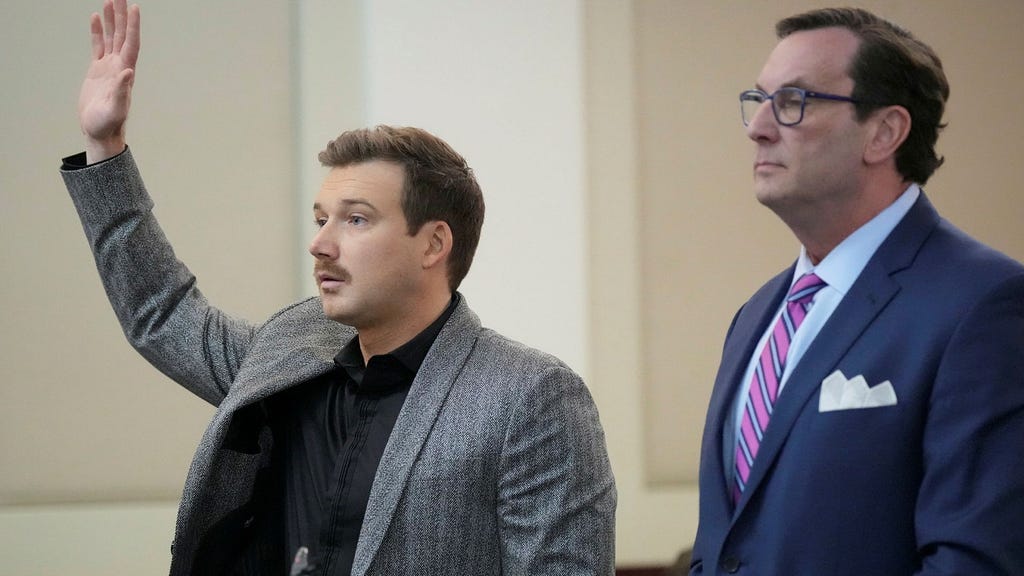The incident involving country music star Morgan Wallen, wherein he hurled a chair from a rooftop, narrowly missing two police officers, has culminated in a legal resolution. While the potential consequences of his actions could have been severe, Wallen ultimately received a relatively lenient sentence of seven days of alcohol education and two years of probation. This outcome raises several questions regarding the appropriateness of the punishment given the potential danger posed to the officers and the broader implications of celebrity accountability. A deeper exploration of the incident itself, the legal proceedings, and the public reaction will shed light on the complexities of this case and the ongoing debate surrounding it.
The events unfolded when police responded to reports of disorderly conduct at a Nashville residence. Upon arrival, they observed Wallen on the roof of the building, where he proceeded to throw a chair off the edge. The chair landed near two officers, narrowly avoiding causing serious injury. While Wallen’s initial claim was that he was unaware of the officers’ presence, the prosecution argued that his actions demonstrated reckless disregard for public safety. The charges against him included disorderly conduct and public intoxication, reflecting the seriousness of the potential harm caused by his behavior. The near-miss nature of the incident underscores the potential for a tragic outcome, raising concerns about the underlying causes of Wallen’s actions and the necessity for preventative measures.
The sentencing hearing focused on mitigating factors and the potential for rehabilitation. Wallen’s legal team emphasized his cooperation with authorities and his expressed remorse for the incident. They argued that the incident was an isolated event fueled by excessive alcohol consumption and that Wallen was committed to addressing his alcohol-related issues. The prosecution, while acknowledging these mitigating factors, stressed the importance of holding Wallen accountable for his actions, especially given his public platform and influence. The judge ultimately decided on a sentence that prioritized rehabilitation over incarceration, emphasizing the need for alcohol education and ongoing supervision.
The relatively lenient sentence sparked a mixed public reaction. Some praised the focus on rehabilitation, arguing that it offered Wallen an opportunity to address his issues and avoid future incidents. Others criticized the perceived light punishment, suggesting that it sent the wrong message about accountability and the seriousness of endangering law enforcement officers. Comparisons were drawn to other cases involving public figures and average citizens, raising questions about equity in the justice system. The debate highlighted the complexities of sentencing, balancing the need for punishment with the potential for rehabilitation and the societal impact of such decisions.
The incident and subsequent legal proceedings have also reignited the conversation about celebrity culture and the responsibility that comes with fame. Wallen’s case serves as a reminder that public figures are constantly under scrutiny and their actions have far-reaching consequences. The incident underscores the potential for fame and influence to exacerbate existing issues, such as substance abuse, and the importance of holding celebrities accountable for their behavior. The debate extends beyond the specifics of Wallen’s case to encompass the broader issue of celebrity influence and the responsibility of public figures to act as role models.
Looking forward, the long-term impact of this incident on Wallen’s career and public image remains to be seen. The incident undoubtedly tarnished his reputation and raised concerns about his personal conduct. Whether he successfully completes his probation and takes meaningful steps towards addressing his alcohol-related issues will play a significant role in his future trajectory. The incident serves as a cautionary tale about the dangers of reckless behavior, the importance of accountability, and the complex intersection of celebrity, the law, and public perception. It also highlights the ongoing need for a nuanced discussion about rehabilitation versus punishment and the role of the justice system in addressing the underlying causes of such incidents.














